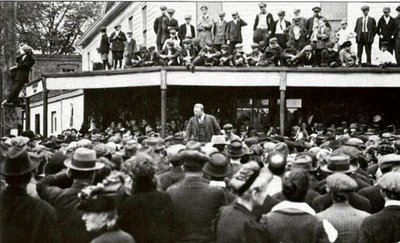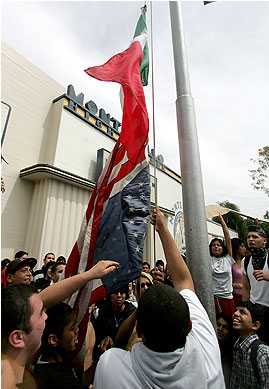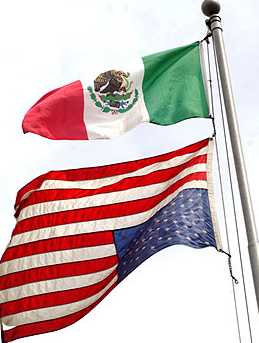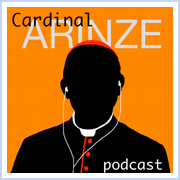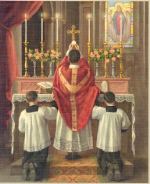From: John 14:6-14Jesus Reveals the Father (Continuation)(Jesus said to Thomas), [6] "I am the Way, and the Truth, and the Life; no one comes to the Father, but by Me." [7] "If you had known Me, you would have known My Father also; henceforth you know Him and have seen Him.
[8] Philip said to Him, "Lord, show us the Father, and we shall be satisfied." [9] Jesus said to him, "Have I been with you so long, and yet you do not know Me, Philip? He who has seen Me has seen the Father; how can you say, `Show us the Father?' [10] Do you not believe that I am in the Father and the Father in Me? The words that I say to you I do not speak on My own authority; but the Father who dwells in Me does His works. [11] Believe Me that I am in the Father and the Father in Me; or else believe Me for the sake of the words themselves.
[12] "Truly, truly, I say to you, he who believes in Me will also do the works that I do; and greater works than these will he do, because I go to the Father. [13] Whatever you ask in My name, I will do it, that the Father may be glorified in the Son; [14] if you ask anything in My name, I will do it."
_______________________
Commentary:4-7. The Apostles did not really understand what Jesus was telling them: hence Thomas' question. The Lord explains that He is the way to the Father. "It was necessary for Him to say `I am the Way' to show them that they really knew what they thought they were ignorant of, because they knew Him" (St. Augustine, "In. Ioann. Evang.", 66, 2).
Jesus is the way to the Father--through what He teaches, for by keeping to His teaching we will reach Heaven; through faith, which He inspires, because He came to this world so "that whoever believes in Him may have eternal life" (John 3:15); through His example, since no one can go to the Father without imitating the Son; through His merits, which make it possible for us to enter our Heavenly home; and above all He is the way because He reveals the Father, with whom He is one because of His divine nature.
"Just as children by listening to their mothers, and prattling with them, learn to speak their language, so we, by keeping close to the Savior in meditation, and observing His words, His actions, and His affections, shall learn, with the help of His grace, to speak, to act, and to will like Him.
"We must pause here...; we can reach God the Father by no other route...; the Divinity could not be well contemplated by us in this world below if it were not united to the sacred humanity of the Savior, whose life and death are the most appropriate, sweet, delicious and profitable subjects which we can choose for our ordinary meditations" (St. Francis de Sales, "Introduction to the Devout Life", Part II, Chapter 1, 2).
"I am the way": He is the only path linking Heaven and Earth. "He is speaking to all men, but in a special way He is thinking of people who, like you and me, are determined to take our Christian vocation seriously: He wants God to be forever in our thoughts, on our lips and in everything we do, including our most ordinary and routine actions.
"Jesus is the way. Behind Him on this Earth of ours He has left the clear outlines of His footprints. They are indelible signs which neither the erosion of time nor the treachery of the Evil One have been able to erase" ([St] J. Escriva, "Friends of God", 127).
Jesus' words do much more than provide an answer to Thomas' question; He tells us: "I am the Way, and the Truth, and the Life". Being the Truth and the Life is something proper to the Son of God become man, who St. John says in the prologue of his Gospel is "full of grace and truth" (1:14). He is the Truth because by coming to this world He shows that God is faithful to His promises, and because He teaches the truth about who God is and tells us that true worship must be "in spirit and truth" (John 4:23). He is Life because from all eternity He has divine life with His Father (cf. John 1:4), and because He makes us, through grace, sharers in that divine life. This is why the Gospel says: "This is eternal life, that they know Thee, the only true God, and Jesus Christ whom Thou has sent" (John 17:3).
By His reply Jesus is, "as it were, saying, By which route do you want to go? I am the Way. To where do you want to go? I am the Truth. Where do you want to remain? I am the Life. Every man can attain an understanding of the Truth and the Life; but not all find the Way. The wise of this world realize that God is eternal life and knowable truth; but the Word of God, who is Truth and Life joined to the Father, has become the Way by taking a human nature. Make your way contemplating His humility and you will reach God" (St. Augustine, "De Verbis Domini Sermones", 54).
8-11. The Apostles still find our Lord's words very mysterious, because they cannot understand the oneness of the Father and the Son. Hence Philip's persistence. Then Jesus "upbraids the Apostle for not yet knowing Him, even though His works are proper to God--walking on the water, controlling the wind, forgiving sins, raising the dead. This is why He reproves him: for not recognizing His divine condition through His human nature" (St. Augustine, "De Trinitate", Book 7).
Obviously the sight of the Father which Jesus refers to in this passage is a vision through faith, for no one has ever seen God as He is (cf. John 1:18; 6:46). All manifestations of God, or "theophanies", have been through some medium; they are only a reflection of God's greatness. The highest _expression which we have of God our Father is in Christ Jesus, the Son of God sent among men. "He did this by the total fact of His presence and self-manifestation--by words and works, signs and miracles, but above all by His death and glorious resurrection from the dead, and finally by sending the Spirit of truth. He revealed that God was with us, to deliver us from the darkness of sin and death, and to raise us up to eternal life" (Vatican II, "Dei Verbum", 4).
12-14. Before leaving this world, the Lord promises His Apostles to make them sharers in His power so that God's salvation may be manifested through them. These "works" are the miracles they will work in the name of Jesus Christ (cf. Acts 3:1-10; 5:15-16; etc.), and especially the conversion of people to the Christian faith and their sanctification by preaching and the ministry of the sacraments. They can be considered greater works than Jesus' own insofar as, by the
Apostles' ministry, the Gospel was not only preached in Palestine but was spread to the ends of the earth; but this extraordinary power of apostolic preaching proceeds from Christ, who has ascended to the Father: after undergoing the humiliation of the cross Jesus has been glorified and from Heaven He manifests His power by acting through His Apostles.
The Apostles' power, therefore, derives from Christ glorified. Christ our Lord says as much: "Whatever you ask in My name, I will do it". "It is not that he who believes in Me will be greater than Me, but that only that I shall then do greater works than now; greater, by him who believes in Me, than I now do by myself without Him" (St. Augustine, "In Ioann. Evang.", 72, 1).
Jesus Christ is our intercessor in Heaven; therefore, He promises us that everything we ask for in His name, He will do. Asking in His name (cf. 15:7, 16; 16:23-24) means appealing to the power of the risen Christ, believing that He is all-powerful and merciful because He is true God; and it also means asking for what is conducive to our salvation, for Jesus is our Savior. Thus, by "whatever you ask" we must understand what is for the good of the asker. When our Lord does not give what we ask for, the reason is that it would not make for our salvation. In this way we can see that He is our Savior both when He refuses us what we ask and when He grants it.
_________________________
Source: "The Navarre Bible: Text and Commentaries". Biblical text taken from the Revised Standard Version and New Vulgate. Commentaries made by members of the Faculty of Theology of the University of Navarre, Spain. Published by Four Courts Press, Kill Lane, Blackrock, Co. Dublin, Ireland. Reprinted with permission from Four Courts Press and Scepter Publishers, the U.S. publisher.


